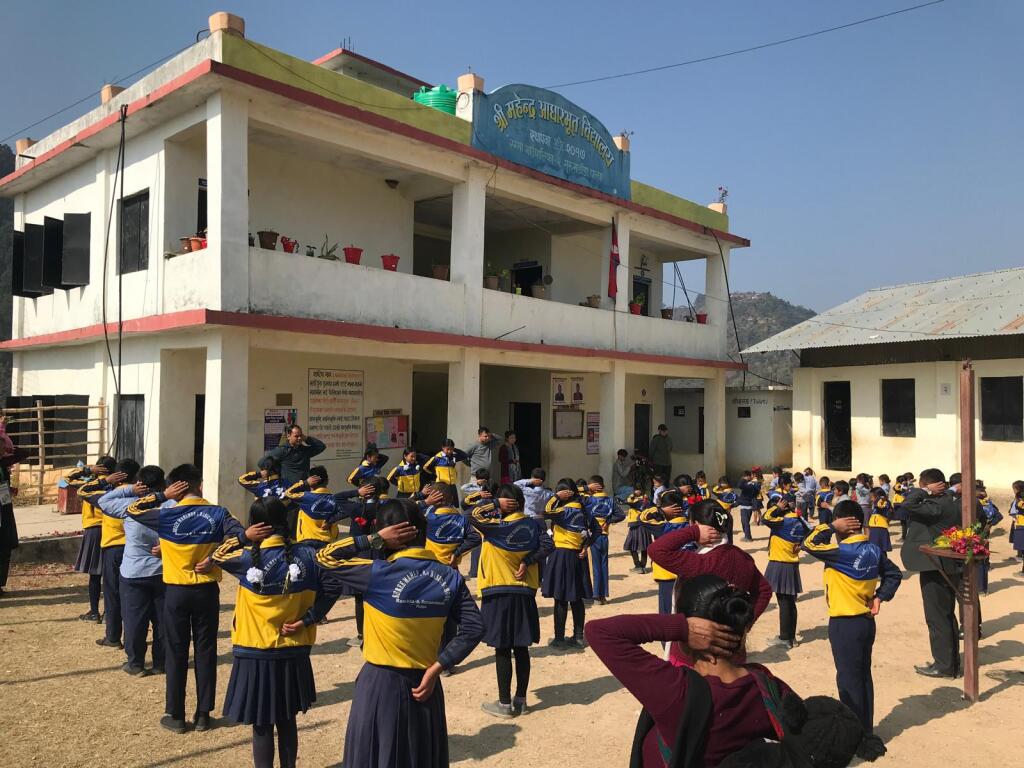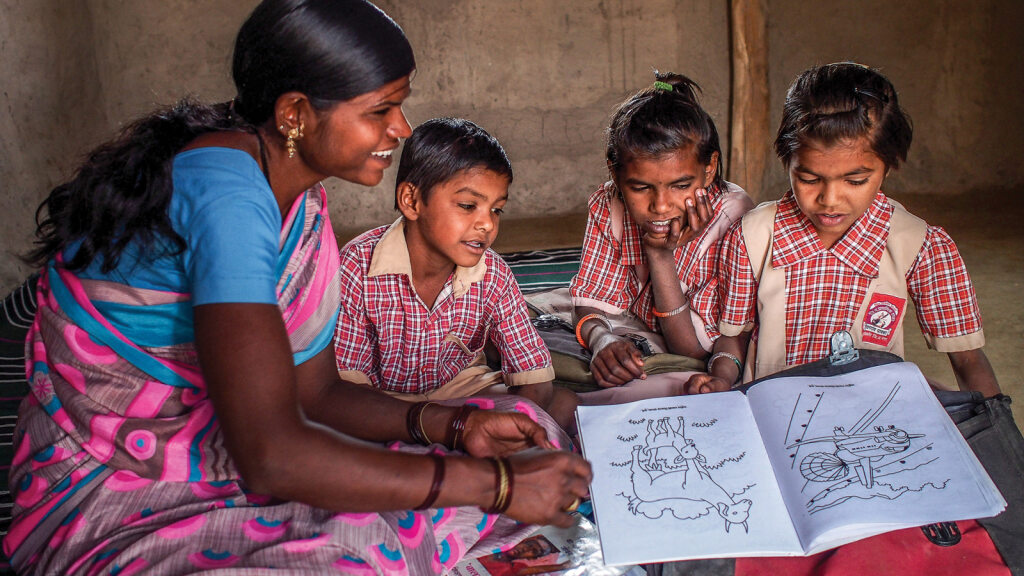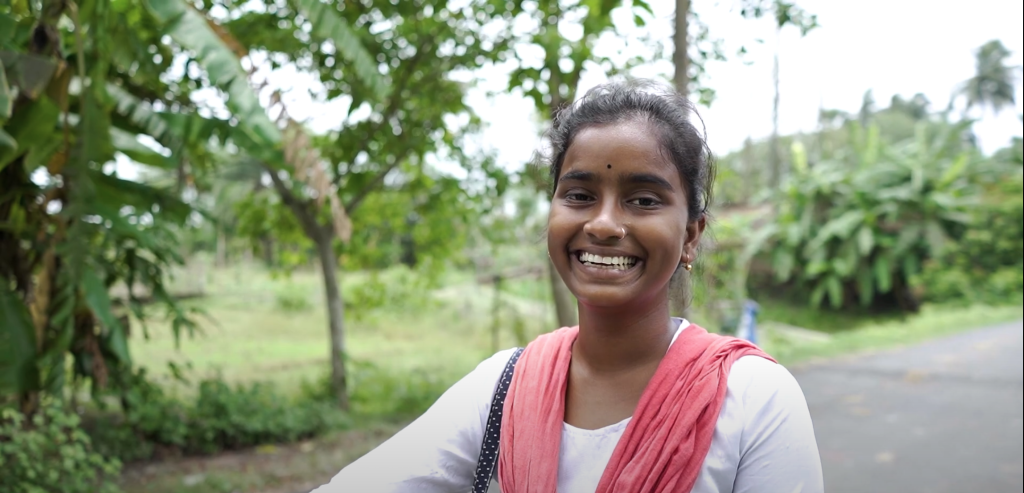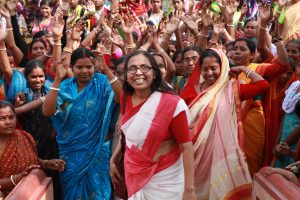Girls’ education is still undervalued in many parts of South Asia. This is especially true in rural communities, where gender discrimination and poverty mean child marriage is often prioritised over girls’ education. Understanding what might force a child or young person into marriage is an essential part of ending this harmful tradition and its impact on girls’ futures.

Despite being illegal, child marriage remains a reality. Among marginalised communities in India, Nepal and Bangladesh, over 50% of girls are taken out of school and married before 18, with a third married before 13. Only one in 100 girls from the poorest communities complete education up to the equivalent of A‑levels. This stark reality sets the scene for examining how barriers to female education unfold, urging action for change.
Understanding the lack of access to education in India, Nepal and Bangladesh for women and girls
Education remains out of reach for many women and girls across South Asia. Let’s look at the latest female illiteracy figures:
| Country | Female Illiteracy* Rate (%) |
| India | 29.7 |
| Nepal | 29.9 |
| Bangladesh | 26.36 |
Sources: UNESCO (India, 2024 Report; Nepal, 2024 Report; Bangladesh, 2021 Report)
*Illiteracy rates refer to the proportion of people aged 15+ years who cannot read and write with understanding.
The literacy rate in South Asia remains low, with around 20% of people unable to read or write. Illiteracy continues to limit girls’ futures.
When girls who are unable to read or write are pulled out of school early, the possibility of ever escaping poverty becomes far less likely. The similarities between the illiteracy rate in Nepal, the illiteracy rate in India and the illiteracy rate in Bangladesh show that this is a pressing issue that needs to be addressed. The lack of access to education across South Asia leaves many women unable to support themselves, locking them into dependency, poverty and limited choices for their futures.

What are the barriers to female education?
Education is vital, yet systemic obstacles still obstruct girls in South Asia:
- Child marriage
Nearly half of girls in South Asia are married before 18. Early marriage interrupts schooling and forces young girls into adult roles, ending their education prematurely. - Cultural expectations and domestic work
Girls are often expected to take on household chores or care for siblings, reducing their study time. - Gender inequality
When families only see boys’ futures as worth investing in, girls lose priority. This attitude worsens barriers to female education and women’s education in India, Nepal and Bangladesh. Find out more about the work we’re doing to combat gender inequality across South Asia in this article. - Poverty
When resources are limited, educating daughters often seems like a luxury. Schooling means incurring costs and lost labour, adding incentives for struggling families to keep girls at home instead of school. - Marginalised communities
Historically excluded minorities face additional discrimination, reducing their educational opportunities further. - Menstrual exile
Without private toilets or sanitary products, many girls miss school during their periods, compounding the existing issues around access to education in India, Nepal and Bangladesh. You can learn more about our work to end menstrual exile on our blog.
These challenges often reinforce each other. For example, poverty may push a family to marry their daughter early, triggering a chain reaction of lost education, reduced economic prospects and lifelong disadvantages.
How forced child marriage creates a lack of access to education in India, Nepal and Bangladesh
Child marriage is when a girl or boy marries before the age of 18. This often ends schooling and starts a life of dependency, early motherhood, and limited autonomy.
Causes of child marriage
What might force a child into marriage?
- Poverty: Early marriage can reduce financial strain for struggling families.
- Tradition: Marrying early is often normalised in the community.
- Lack of awareness: Families may not know the legal age or consequences.
- Gender bias: Girls’ education and their right to consent is deprioritised compared to boys’.
- Low school quality: Poor learning environments encourage early marriage.
Child marriage facts
- Over 50% of girls in South Asia are married before 18.
- Nearly one-third of girls are married before 13.
- Child brides are less likely to complete secondary school.
The effects of child marriage
- Impacts on education:
Increases the likelihood of girls dropping out of school and reduces their access to vocational training.
- High mortality rates:
Early pregnancy increases the risk of childbirth complications.
- Domestic violence:
Young brides are more likely to face abuse and restricted freedoms.
- Isolation:
Girls move in with their husbands or in-laws, losing community and schooling support.
- Mental health:
Early marriage increases anxiety, depression and loss of self‑worth.
The forced child marriage of a young girl abruptly ends her education, cutting her off from opportunities and trapping her in dangerous situations.
What are the benefits of inclusive education?
Inclusive education means schools welcome all genders, backgrounds and abilities equally. Its advantages are significant:
- Equity:
Ensures girls’ education in India, Nepal and Bangladesh is treated as essential.
- Prevention:
Teaches respect for girls, reducing violence and early marriage.
- Empowerment:
Girls gain confidence, knowledge of rights and economic independence.
- Community progress:
Educated girls become leaders, creating change locally.
- Better retention:
Sensitised teachers and improved sanitary facilities help girls stay in school.
When access to education in India, Nepal and Bangladesh is truly inclusive, with sanitary provision, teacher training and awareness among families, it improves women and girls’ education outcomes and disrupts harmful gender norms, promoting a more equal and prosperous society for all.
Education opens doors beyond the classroom
Access to education doesn’t just help girls pass exams. It transforms futures, building confidence, independence and safety.
Through Karuna’s projects, women and girls gain more than academic support. They access legal advice, leadership training, vocational skills and social networks that help them reclaim agency in their lives.
“Without support, many are destined to live lives of isolation and abuse. Karuna supports 50,000 women annually… Once unable to read or write, Dwarkabai learned finance and entrepreneurial skills. She now leads a Karuna‑supported women’s group, passing that flame onto other women like her.”
These women’s groups offer more than skill-building – they’re safe havens, places where women experiencing abuse can find support and solidarity. Dwarkabai’s story shows how women who were once denied education are now leaders in their communities, showing others what’s possible.
Similarly, Suravi – once a student in a Karuna-supported girls’ group – now coordinates several such groups herself. She offers the next generation not just guidance, but proof that life can be different.
Watch these videos to learn Neha and Kavi’s stories about how they’ve overcome the challenges so many young women and girls face:
These stories show us why education is life-saving. It’s not only about keeping girls in school — it’s about giving them the power and autonomy to shape their own futures.
Creating change with community: Karuna’s education projects
Karuna takes a long-term, shared approach to breaking the cycle of poverty, discrimination and child marriage. Working closely with trusted local partners across India, Nepal and Bangladesh, each project is developed and delivered collaboratively with the community.

Karuna’s multi-pronged strategy addresses the many factors that stop girls from accessing education — poverty, gender discrimination, poor school infrastructure and social norms around marriage. This means working with girls and their families, training teachers, creating safe spaces for learning, supporting livelihoods and collaborating with local education authorities.
From catch-up classes and dignity centres to livelihood support and leadership training, Karuna’s projects are designed to remove the real-world obstacles girls face. By working directly with community members and local stakeholders – mothers, school committees, municipal authorities, youth groups – our work helps bring about lasting change that reflects local needs and values.
Nepal: REED – Learning Champions Project
In parts of Nepal, especially within Dalit and marginalised communities, access to education remains a serious challenge. For many girls, poor quality teaching, gender bias, economic hardship and minority-based discrimination create a perfect storm that leads to early dropout and, often, forced child marriage.

The Learning Champions Project aims to improve the quality of education and reduce school dropout among girls. It does this by training teachers, setting up community-based support like Dignity Centres and addressing economic pressures on families.
- At least 8,047 children and youth from Dalit and marginalised communities are enjoying continuous and quality education.
- Seven Dignity Centres and six Learning Hubs are helping out-of-school girls re-enrol.
- 450 teachers received 10 days of teacher training.
- Ten entrepreneurship capacity development trainings involving 387 mothers.
- 65 girls re-enrolled through second-year efforts.
- Municipal buildings are offered free of charge as Dignity Centres.
India: Nishtha Project (West Bengal)
In coastal areas of West Bengal, such as Namkhana, extreme poverty, climate vulnerability and entrenched gender roles make it difficult for girls to continue their education. The Nishtha Project steps in with a multifaceted strategy that works with entire families.
- 800 girls and their parents were supported to stay in school and avoid early marriage.
- 98.4% of girls passed their board exams; only one child marriage in the cohort.
- Girls’ groups offer leadership training and peer support.
- Teachers and school committees were trained.
- 47 child marriages averted; 3 trafficking rescues.
- 291 individuals supported in accessing schemes.

India: NISD Project (Maharashtra)
In rural Maharashtra, girls often drop out before secondary school due to distance or family pressures. The NISD project tackles these barriers by giving practical support.
- 2,455 girls supported.
- 164 women’s self-help groups formed.
- 2,168 parents attended awareness training.
- 477 girls received educational materials.
- Out of 230 who passed 10th standard, 209 enrolled in junior college.
- 35 kitchen gardens and 5 poultry units established.

Bangladesh: Child Hope Gram Bangla
In Dhaka, some children work as waste pickers on one of the world’s largest refuse dumps. Child Hope Gram Bangla runs an education centre near the site, offering children a different path.
- 215 child waste pickers enrolled.
- 140 children now attend regularly.
- 50% of parents are accessing government safety nets.
- 125 children met key learning competencies.
Education is life-saving: Why your support matters
A future girls deserve
Education is more than a lesson – it’s protection, power and potential. A girl who stays in school past age 16 is far less likely to marry early, experience violence or live in poverty. Education opens doors to employment, personal agency, and health. It also equips future mothers, leaders and workers to build stronger families and communities.
Across India, Nepal and Bangladesh, too many girls are denied these opportunities. Without action, they risk becoming one of the many invisible stories behind the literacy rate in South Asia, trapped in cycles of forced child marriage, abuse, and poverty.
We believe that education is life-saving. That’s why we work in the most marginalised communities, addressing the root causes of lack of access to education in India, Nepal and Bangladesh. Our programmes don’t just put girls in classrooms; they build the support structures – emotional, social, legal and financial – that keep them there.
Help us reach more girls
- 94% of girls in Karuna’s projects stay in school past the age of 16.
- We’re aiming to raise £30,000 to support 13,600 children this year.
Your support funds safe learning spaces, dignity centres, teacher training, sanitary products, bicycles, school materials and, above all, hope.

Every contribution helps us answer the question: what are the benefits of inclusive education? The answer lies in girls like Suravi, who once received educational support through Karuna and now leads girls’ groups herself.
Donate today and give the gift of liberation through education.
Thank you.
Check out more of our articles about the work we’re doing with our partner across South Asia on our blog:
Ways that Karuna is Working to Overcome Gender Inequality in South Asia
Sustaining change: why locally led development works – but funding models hold it back
How to Build a Meditation Practice with Tips from the Karuna Team
The Challenges Faced by Migrant Workers in South Asia
Menstrual Exile: The Dangers of Chhaupadi in Nepal and What it Means for Women and Girls
The Importance of Championing Female Empowerment in India, Nepal and Bangladesh





